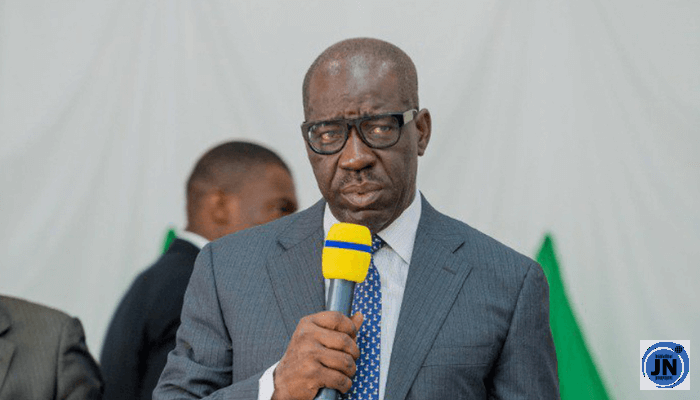The Economic and Financial Crimes Commission (EFCC) has intensified its investigation into the financial activities of former Edo State Governor, Godwin Obaseki, placing him under close scrutiny due to alleged irregularities during his administration. The anti-corruption agency is reportedly examining various contracts and transactions executed throughout Obaseki’s eight-year tenure as governor, focusing on the financial management of the state during that period.
Obaseki, who completed his term on November 12, had previously expressed concerns about the possibility of facing arrest after leaving office. He claimed that the EFCC had plans to detain him immediately following the end of his tenure, raising alarms over what he described as politically motivated actions. However, the EFCC has maintained that its investigation is part of its routine monitoring of former public officials and that its focus remains on ensuring transparency in the management of public funds.
In response to the ongoing investigation, Edo State’s newly inaugurated governor, Monday Okpebholo, has taken a proactive step by setting up a 14-member State Assets Verification Committee. This committee is tasked with reviewing the management of state assets under Obaseki’s administration, with a specific focus on identifying any potential discrepancies or signs of financial misconduct. The move is seen as part of the broader effort to ensure accountability and restore confidence in the state’s financial system after the change in leadership.[/p>
One of the significant developments in the investigation occurred on November 2, when the EFCC detained five senior officials from Obaseki’s government, including the state’s Accountant General, Julius Anelu. These officials were taken into custody over their involvement in what has been described as significant and suspicious withdrawals from the state treasury within a very short period. The EFCC’s move has sparked a public debate about the financial operations of Obaseki’s government, with many calling for further scrutiny and accountability regarding the handling of state funds.
Despite these developments, Godwin Obaseki has maintained his readiness to cooperate with the ongoing investigation. In a public statement made on November 8, Obaseki expressed his confidence in facing the probe, stating that he has nothing to hide and is fully prepared to account for his actions during his tenure as governor. He emphasized that he had worked within the boundaries of the law and insisted that he would cooperate fully with the EFCC to clear any doubts about his administration’s financial practices.
However, sources within the EFCC, who spoke on condition of anonymity, revealed that, as of now, no conclusive evidence of wrongdoing has been found against the former governor. According to one of the sources, the investigation into Obaseki’s administration is still in its early stages, and while the EFCC is examining contracts and other transactions from his time in office, it has yet to identify any direct involvement by the former governor in any illegal activity. The source explained, “An investigation into his administration has started, but he won’t be invited until we reach an advanced stage. So far, many transactions are not directly tied to him, as he delegated responsibilities to others. Our team is pursuing leads on contracts and other transactions under his tenure.”
Another source from the EFCC provided additional context by revealing that former governors, including Obaseki, are automatically placed on the EFCC’s watch list once they leave office. This precautionary measure ensures that former public officials remain within reach of the agency, particularly in cases where investigations may take a prolonged period. The source stated, “All former governors are monitored by the EFCC, regardless of active investigations. This prevents them from leaving the country while cases are ongoing.” This is a standard procedure meant to prevent suspects from evading the law during ongoing investigations, which is especially pertinent given the complex nature of financial probes involving public officials.

